I have a Scottish address.
I wake up under two slanted skylights on the wood-paneled A-frame ceiling above my loft, through which Saint Andrews usually serves me a blue sky and fast-flowing clouds drifting like sea foam toward the ocean, only a minute’s walk east. A chorus of seagulls and other small birds surf the sea breeze or roost on the narrow chimney tops of these old British homes. My loft stays fairly warm, but I pull on a robe and slippers before descending the stairs. Since my rental is part of a much larger structure not originally intended for multiple-occupant residency, the carved wood banister and plush navy carpet puts the square white plaster and brown tweed flooring of my every past apartment to shame.
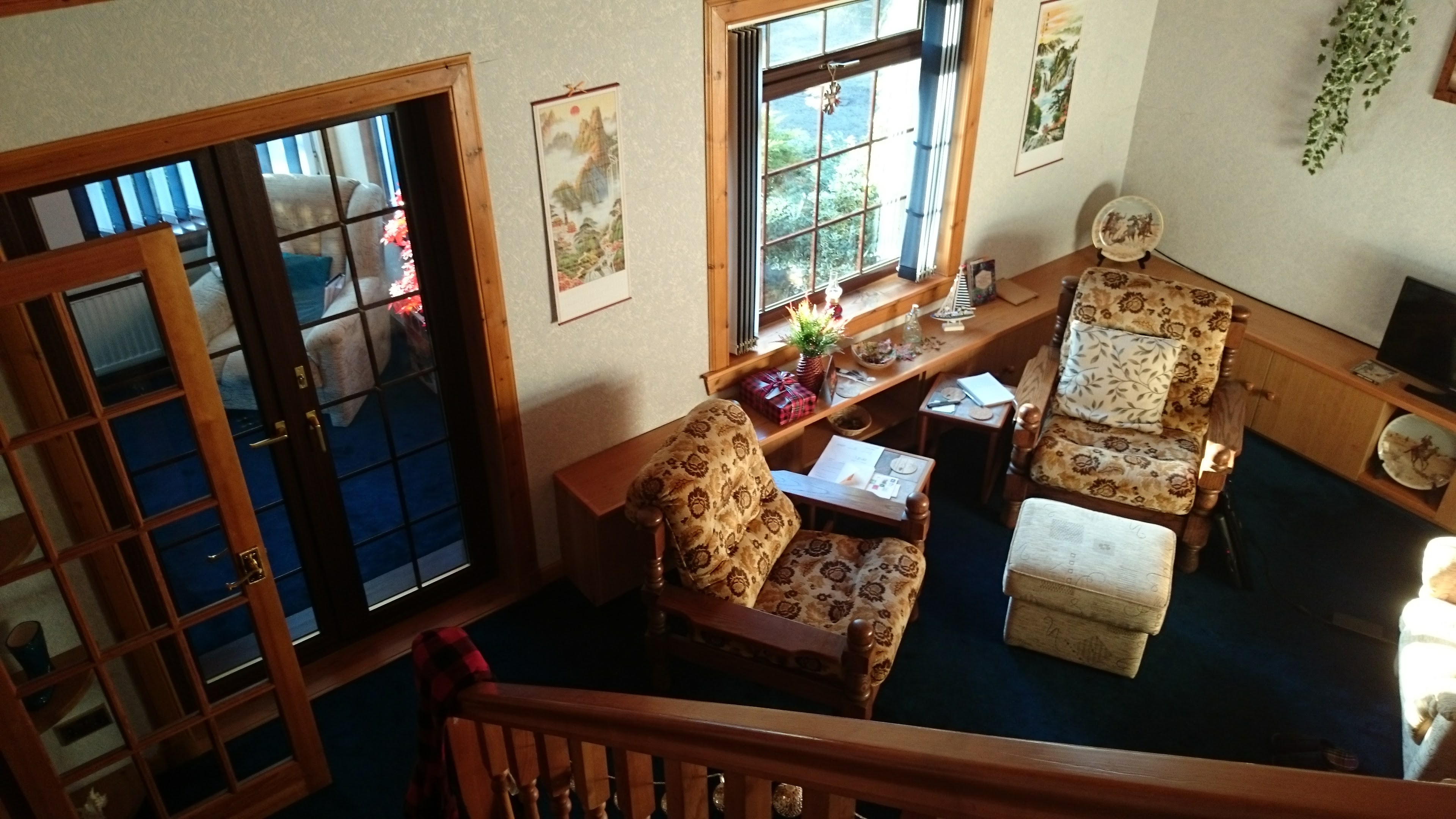
There are lots of doors in these old British homes, which I think is designed to better insulate and control the heat, but it also optimizes sound insulation and privacy between various parts of the small structure, as well as providing added fire safety. So at the foot of the stairs I open a beautiful glass-paned door into the hall, which leads to a little foyer on the right and a bathroom to the left.
Foyers seem to be a common staple to these old homes. Walking around town, I see a lot of front doors framed in small pop-out rooms extending from the primary structure, usually abundant with windows – like a small green house for people. I assume that the household packs into these rooms on sunny days to optimize their vitamin D intake.
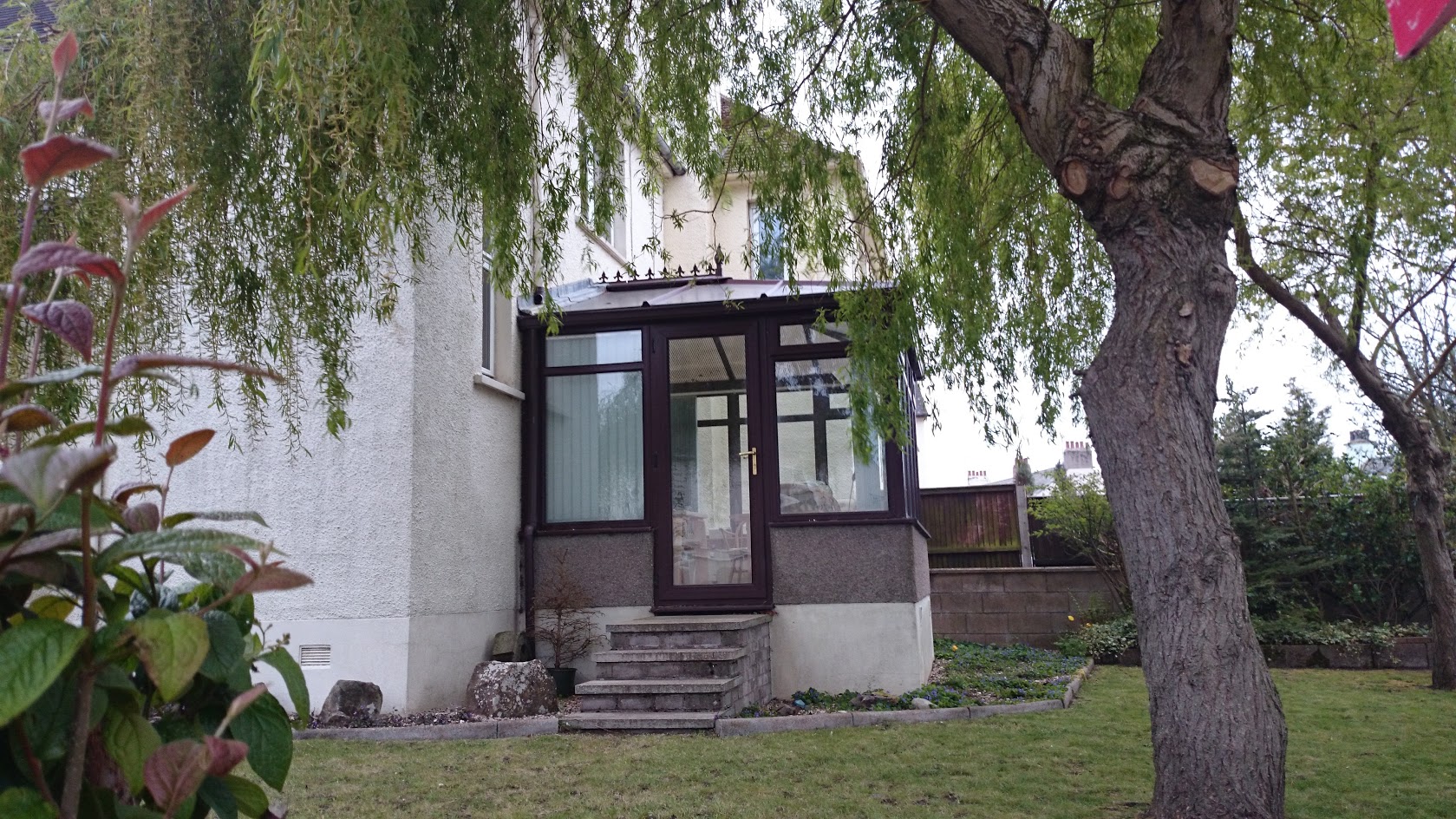
A glass foyer.
My mail comes through a slot in the front door. This may be “a thing” in some parts of the States, but as a Californian it’s completely new to me, and I love it. Sure it barricades the door and I have to step over it when I come through, but if I’m inside already it’s just added insulation. Best of all, there’s no need to tromp through the elements for statgecoach-era communication! Speaking of which, my community is highly communicative. I’m not absolutely sure if other places I’ve lived are not or if their communications just got lost in the glut of spam mail. Which is another thing I love about Britain: you can legally refuse spam mail. When I attempted to do this in the States I was informed that the U.S. post is required to deliver every article even if it’s addressed to “Resident.” Although I’m opposed to passively endorsing this waste on principle, I was completely powerless to stem the tide. In Scotland, I can just put up a little sticker on the slot specifying, “Addressed Mail Only, Please” and voila – no more spam! I was extremely excited to purchase one but since there’s no consumer bread crumb trail established yet for corporations to follow to me, or because they’re just less overbearing in general, I haven’t been compelled to employ it. Besides, I’m afraid that it might deflect the community mailings, which I quite enjoy.
The bathroom at the other end of the hall is a proper bathroom with full bath as well as toilet, but most Brits will scoff if you refer to a room without a bath as a “bathroom,” since what we would call “half baths” in the States are really just a toilet (and they call them as such, as well as the “Lavatory,” the “Gents” or my personal favorite, “The Loo”). And if you’re ever abroad and looking for a public toilet, you might try the door labeled “WC” and hope it’s a Wash Closet and not the private carriage of a Wembley Cockfoster or Wimpleton Cumblebutt. A “Wash Closet” is another name for the Loo, and a common identifier throughout Europe.
Straight across the hall from the bottom stair is another door leading to the kitchen, so I pad across the slate tile floor in my slippers and fire up the electric kettle. Electric kettles are to British homes what coffee pots are to American ones. Everyplace I’ve stayed within the UK, be it hotel, b&b or cabin in the wilderness, came equipped at minimum with an electric kettle and tea fixings. You can acquire a conventional coffee maker, but they don’t come standard since not everyone drinks it. This is fine, however, since I’ve lately discovered that percolated coffee is kind of crap, thanks to a devious friend who cured my disinterest in the stuff by gifting me with a fancy French Press. Back home I’d taken to bringing the water to boil in an old fashioned tea pot, but the ordinarily patient Brits drink such copious amounts of hot beverages that they can’t be bothered to wait, so electric kettles it is. And they do come in handy. Mine sounds like a miniature jet engine taking off, but I depress the small pedal at its base and then exit the room, closing the door and sealing the bulk of the noise pollution behind me. I then attend to my morning necessities, and when I return a few minutes later the kettle is silent and the water is steaming. I scoop some coffee into a cheap press I acquired on Amazon, pour the water and seal, allowing it to steep for a few minutes while I wash the dishes. My kitchen sink overlooks a very British view, with a tiny courtyard framed by the stucco wall of a neighboring courtyard to the left, the back of a cobblestoned structure across, and my own entry at right, with a wash-line and small tree framed at center.
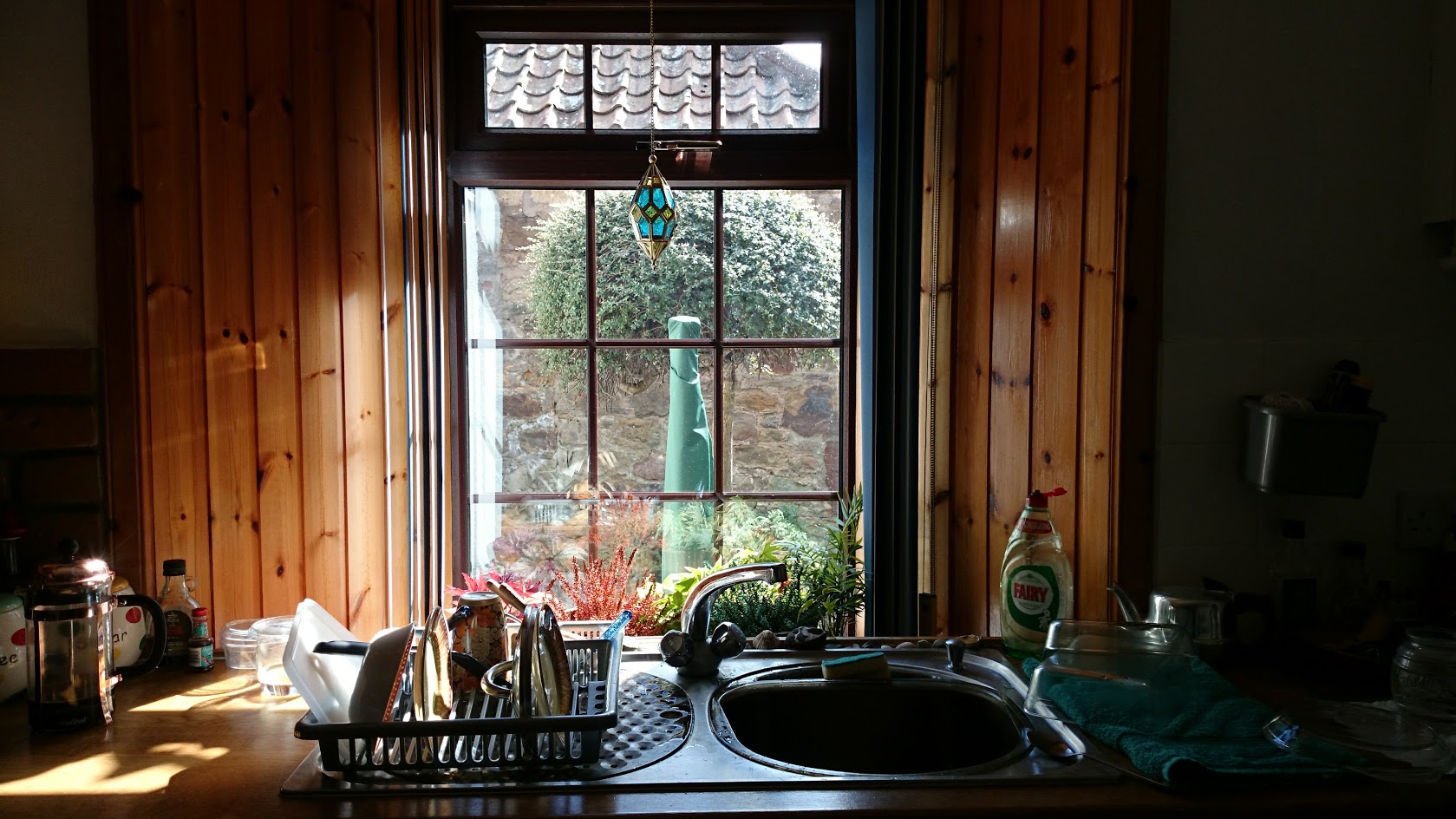
The kitchen view.
I take my freshly pressed coffee back across the hall into the sitting room, where I enjoy the morning sun as the fog burns off. In St Andrews, a typical day seems to include all kinds of weather. It no longer concerns me if it’s suddenly raining when it was sunny ten minutes before, as odds are it will be sunny again before I next remember to look up from my work. I once experienced three showers interspersed with dazzling sunlight over the course of an hour.
After I’ve had my coffee and caught up on my favorite web comics, I head back to the bathroom and give the pull switch right inside the door a tug. This turns on the water to the electric shower, though it doesn’t start running until I switch on the heating mechanism, itself. The heating element is encased in a plastic structure attached to the wall, and as soon as I depress the “on” button the water pours forth and the water is heated internally. Since the water is heated on demand, there’s no need to keep water in a tank constantly boiling, and there’s no possibility of running out of hot water – a particularly nice feature in any communal living space. It’s unclear to me why electric showers have never caught on in the States, since they’re quite common in other parts of the world. My brother had a rather fraught encounter with them in Mexico, and they were standard at every stop of our family trip to Thailand. Developing nations like these can lead to poor or dilapidated installations (leading to my brother getting a nice morning wake-up shock when he adjusted the temperature on the metal faucet) but the strict regulations in Britain rigidly separate the weak current from coming into contact with anything conductive, and a quick google search returned no alarming statistics related to shower incidents.

The electric shower.
When it comes to my favorite features of the British home, however, radiators may have the edge: these are metal heaters warmed by steam, and typically placed throughout the house; my small apartment has a total of 7: one in the foyer, the hallway, the kitchen, the bathroom and the bedroom, and two in the sitting room. Towel bars are strategically placed directly above them in the kitchen and loo, so that wet towels have been merely a fading memory while I’ve lived here. I can control the temperature of the radiators via the central control station in the kitchen, or adjust each one individually by the knob at its base. The knobs each have a dial reading snowflake to fan; dials are typically set to the snowflake position when Scotlanders are away from home, so that a minimal amount of heat is maintained to keep pipes from freezing. The opposite end of the spectrum indicates that the valve is fully opened for maximum heat. I keep all but the radiator in the loft on max, and then manage the actual temperature of each simultaneously through the central heating system – a wall installation with a temperature dial and three functions: On, Off, and Timer. The timer allows me to have the radiators come on before I get up in the morning, turn themselves off when I’m usually out of the house, and take the chill off again before I get home. I initially thought this would be an incredibly useful feature, but since I get around mostly by walking, now, I tend to be a self-fueling furnace myself. (Really cuts down on the heating bills.) Switched on, the radiators pump heat at just the right temperature to rest your bum against without burning; also known as cat-magnet temperature; a fact which British cats exploit as you’d expect.
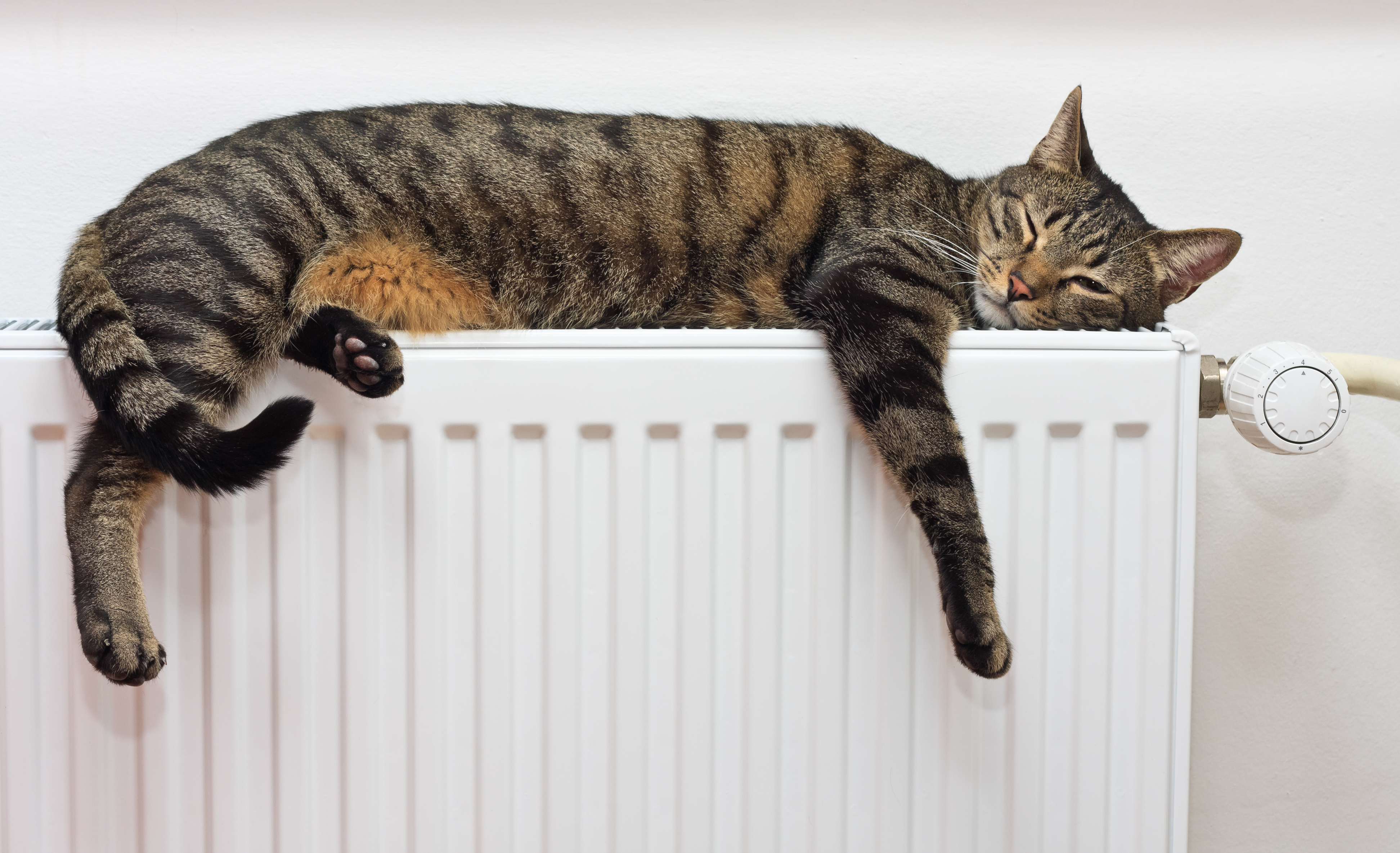
I dry off with my warm-and-toasty towel, slip into a polyester robe and slippers, and return to the kitchen. One of the hardships of transitioning to a new culture is adjusting to the different groceries available. Somewhat surprisingly, differences persist even within the global market; one of the primary jobs of the controversial European Union, for example, is to make import goods more difficult than local ones to acquire. Many brands available in the U.S. are branded differently in the U.K., making them difficult to search for or recognize on a shelf, but other more localized brands aren’t imported at all. In my case, Dennisons canned chilli beans and Hickory Farm’s summer sausage were cornerstones of my diet that suddenly became unavailable. But rather than dwelling on the inaccessible, it’s a good opportunity to discover similar delights that are exclusive to the host culture, so that you are primed to enjoy that same crushing state of dietary withdrawal in the reverse! There can be no return to innocence from having known Scotch eggs (boiled eggs baked in breaded meat), cumberland (deliciously spiced) sausages, pasties (like commercial Hot Pockets but better), sausage rolls, macaroni pies (just as they sound), mulled (spiced) wine, sticky toffee pudding (ginger cake with hot toffee sauce), shortbread, and buttered CRUMPETS (to which english muffins are an inferior mongrel cousin, and no substitute).
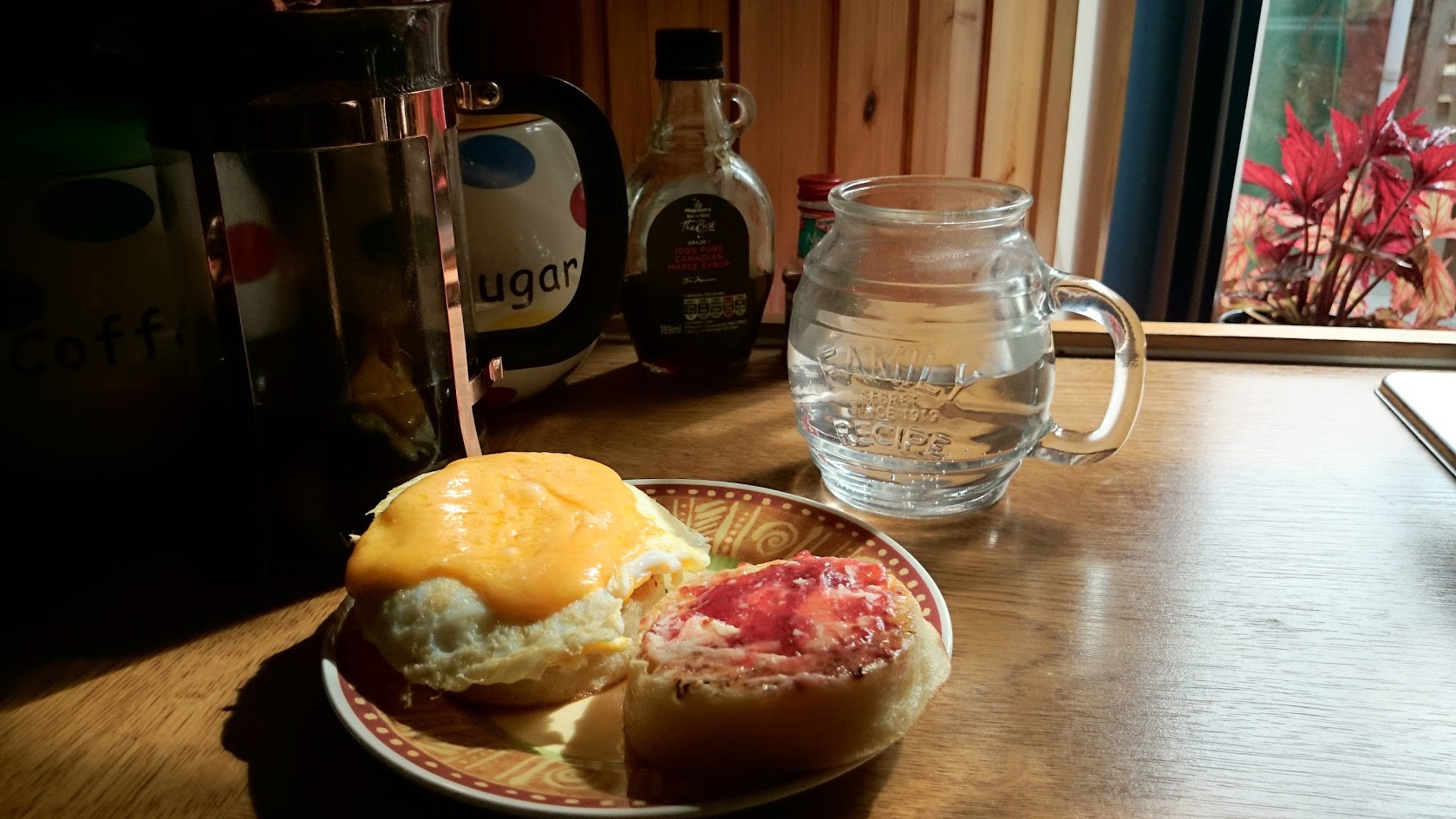
Crumpets with egg and jam.
Another delight of renting in the UK is that even budget apartments often come equipped with a dishwasher and clothes washer. Some clothes washers even double as dryers (they flip on a switch) but most include a traditional clothesline for the purpose. Due to space restrictions, the compact machines are generally installed in the kitchen or bathroom, and are often completely camouflaged among the cabinets. I pull a load of clean clothes from the washer under my kitchen counter. It’s too cold outside, yet, to take advantage of the clothes line, so I attire the household radiators in my various garments. The house soon smells of clean laundary. Within the hour I’ll be able to encase myself in a preheated shirt, socks and trousers (don’t call them pants in Britain unless you mean to have your audience imagining your underpants!).
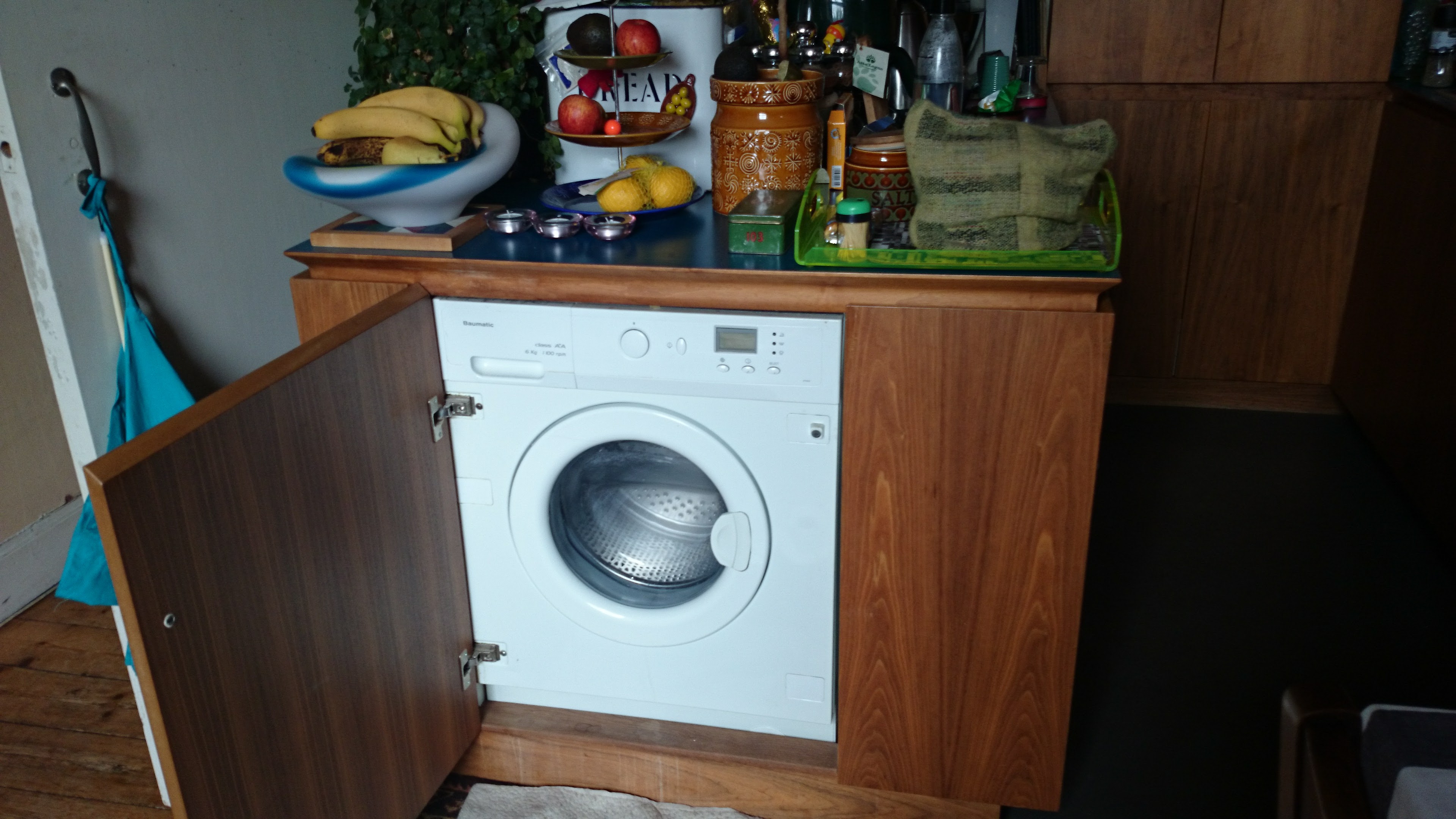
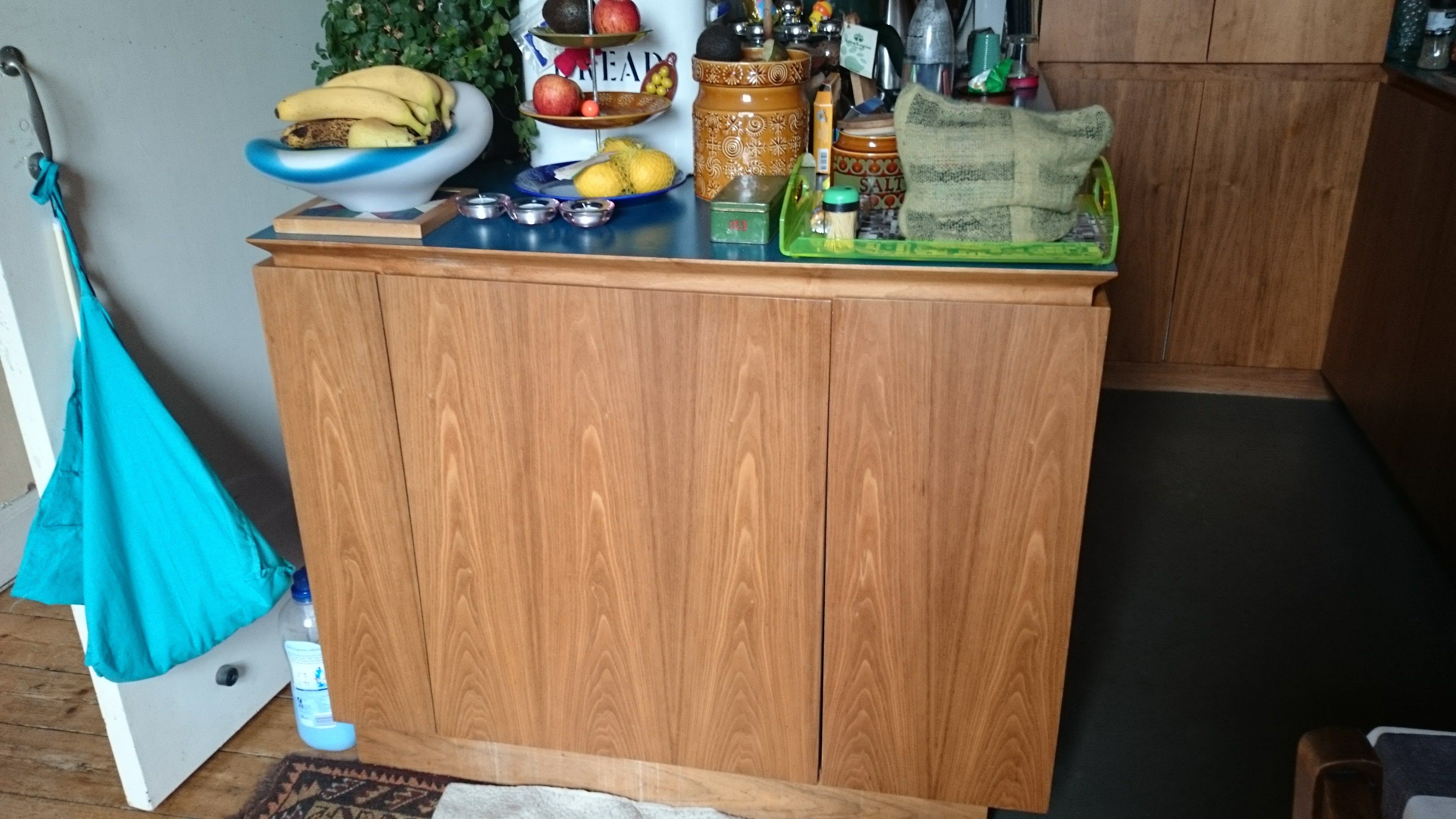
These old homes don’t come preinstalled with as many outlets as modern ones, but I’ve managed this with the use of powerstrips. Cable internet also doesn’t seem to be common here, but my Broadband DHL gets about 40Mbps, which is as much as I ever got out of Comcast. It’s also less expensive: I rent the phone line for £18.99 and pay £10.00 for Unlimited data, which comes to a monthly bill of about $37.50 USD. I’m going to miss this when I leave.
I pop online now to order some take away (delivery or take-out for those of us from the States). Websites like OrderTakeaway.co.uk and just-eat.co.uk make this absurdly easy. I locate my venue in their directory and make my selections from the online menu. At checkout, I enjoy the convenience of another quirk of British life: residence-specific postal codes! I don’t know how this works, but every time I need to fill in my postal address, web forms always start by asking for my postal code. I plug in my post-code, which is a 7-character alphanumeric string, and upon entering that information, the webpage propogates the remainder of my address, right down to the name of the residence. Since I’m in a complex, it only asks me to confirm my house number, which I select from a drop down list of my nearest neighbors. Now if only this would catch on in the States. I suppose there just aren’t enough numbers…

Deliveroo- a popular food delivery service.
I select to pay by cash or card and within the hour there’s a knock at my door. The take away service outsources the delivery to another company called Deliveroo. What’s interesting is that these guys usually arrive by bicycle or moped, so I can only guess that the company employs staff in every neighborhood to maintain the efficiency I’ve observed. The delivery person hands over my order with a brief exchange of pleasantries and departs, without waiting for a tip. Since employers are required to pay a living wage without factoring in gratuity, tips are not expected. The minimum wage in Scotland is about $9.30 USD, beating out the federal minimum in the US by over $2.00, even though cost of living is generally lower here. The minimum wage hasn’t been raised in the States since 2009, whereas in Britain it’s gone up every year in the past decade. What’s interesting about the absence of tipping culture is that servers aren’t obligated to be nice to customers in the hopes of netting a little extra. The downside is that service doesn’t always come with a smile, but the upside is that when it does it’s typically genuine. My Deliveroo drivers always seem pretty happy with their lot in life which, in my view, makes the interaction feel less exploitative and more positive all around.
I could really get used to this life.




